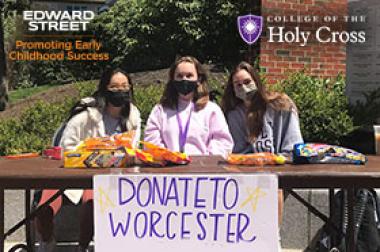
By Guest Blogger Colleen Shortell
At a time when the COVID-19 pandemic continues to interrupt children’s most formative years, early education and literacy are more important than ever.
Learning from behind a screen, forfeiting opportunities for socialization, and observing a world riddled with illness, fear, and the unprecedented “new normal” are just a few barriers to early childhood success.
Yet amidst these challenges, first-year students at the College of the Holy Cross in Worcester, MA ignited a conversation about the vast inequalities of early childhood as part of their year-long Montserrat seminar.
Led by Holy Cross psychology professor Danuta Bukatko, Ph.D., students coordinated the fundraising and donating of author Grace Byers’ I am Enough to Worcester families and created the website You Are Enough.
 Professor Bukatko (top left) with Maggie, Vienna, Clay (top row); Annie, Ryan, Chris, Jess (second row); Katie, Lauren, Blake, Lianna (third row); and Christina, Zach, Nicole (fourth row).
Professor Bukatko (top left) with Maggie, Vienna, Clay (top row); Annie, Ryan, Chris, Jess (second row); Katie, Lauren, Blake, Lianna (third row); and Christina, Zach, Nicole (fourth row).
You Are Enough features videos of Holy Cross students reading children’s books, to encourage families to read together; an array of activities such as matching games and printable coloring pages; and vital information about early literacy as well as race and gender equity.
The project, which was chosen, designed, and implemented by students, grew out of an exploration of societal values instilled in children’s literature. Students learned how even the youngest children internalize personal identity from social constructions of race, gender, and power. Professor Bukatko also noted the importance students placed on reading books during their own childhoods, and their dismay when learning that many young children don’t have the same opportunities.
The inequalities of early childhood were further discussed during a classroom visit by Edward Street Executive Director Eve Gilmore. Professor Bukatko said that students were particularly impacted by “how few resources are actually allocated to young children and what the social costs of that lack of allocation are,” as explained by Gilmore.
“I have always considered early childhood education as a crucial part of one's life, but I did not realize that [the lack of it] could hinder one's development so severely,” said Margaret Smith, one of the students.
Reading time is a fundamental aspect of child development. As written on the You Are Enough website, child literacy tackles some of the stereotypical social perceptions embedded within literature by teaching children “to recognize inclusively diverse relationships, equality amongst peers, and the attributes of different cultures.”
Said Smith, “we chose to donate I am Enough because it was inclusive, and everyone could relate in some way.”
Regardless of whether students enter the field of education, the knowledge and experience they gained from this hands-on project will follow them as they become parents, donors to organizations, and voters in elections that have the potential to enhance education and care for children.
“After working with this group of first-year students, I am more convinced than ever of the value of unleashing the creativity and talents of our students in the form of project-based assignments that strive to solve some of our social problems,” Bukatko stated. “You can see the results ー these students give me great faith in the next generation!”
